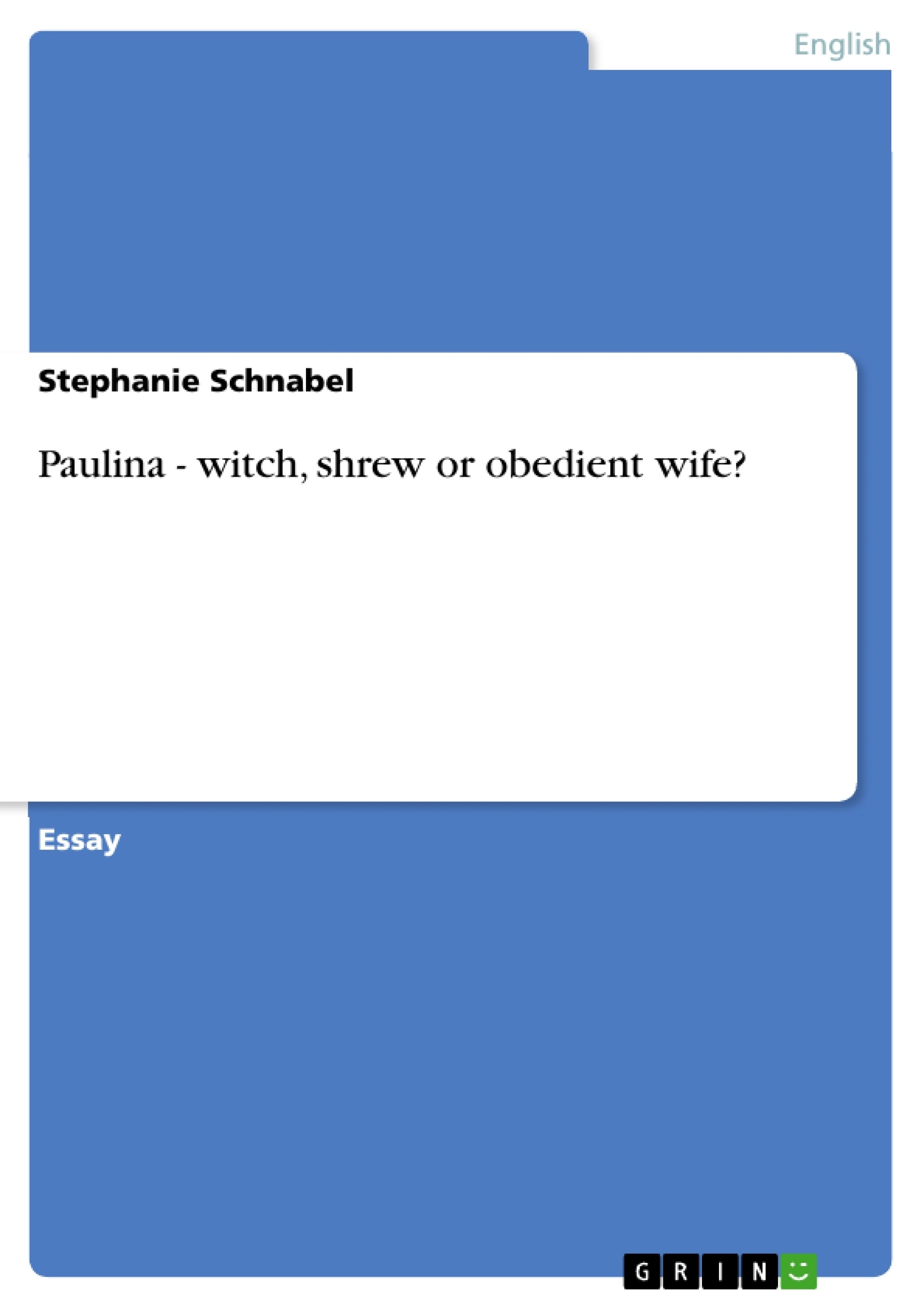In diesem Essay wird Paulina, eine Figur aus Shakespeares "The Winter's Tale" kurz beschrieben und ihr Verhalten gegenüber den männlichen Figuren, insbesondere Leontes, analysiert. Sie ist nicht der typische Frauencharakter, den man erwarten würde. Die Gründe für diesen Eindruck werden hier nun näher beleuchtet.
This essays deals with Paulina, a character in Shakespeare's "The Winter's Tale". Her behaviour towards the male figures is described shortly before her speech and interaction with the other characters, especially with Leontes, the King of Sicily, are analysed in depth. She is not 'the typical woman' and this essay tries to provide some possible reasons.
Inhaltsverzeichnis (Table of Contents)
- Paulina's Appearance and Action
- Paulina's Confrontation with Leontes
- Paulina's Gender-Transgression
- Paulina as a "Mankind Witch"
- Paulina's Emotional Outburst
- Paulina as a Witch
- Conclusion
Zielsetzung und Themenschwerpunkte (Objectives and Key Themes)
This text examines the character of Paulina from William Shakespeare's The Winter's Tale, analyzing her actions and speech within the context of the Renaissance era. It explores the ways in which Paulina challenges conventional gender roles and confronts male authority.
- Paulina's defiance of gender norms
- The power of language and its role in shaping identity
- The portrayal of female characters within Shakespeare's plays
- The historical context of gender roles and expectations in the Renaissance
- The use of symbolism and imagery in depicting Paulina's character
Zusammenfassung der Kapitel (Chapter Summaries)
- Paulina's Appearance and Action: This chapter introduces Paulina and highlights her independent and outspoken nature. It explores her initial interactions with Leontes and Antigonus, establishing her role as a defender of justice.
- Paulina's Confrontation with Leontes: This chapter focuses on Paulina's direct challenge to Leontes' accusations against Hermione. It analyzes the language used by both characters and examines the societal expectations regarding female behavior in the Renaissance.
- Paulina's Gender-Transgression: This chapter delves into the ways in which Paulina transgresses gender boundaries through her actions and speech. It explores the societal response to women who challenged conventional gender roles, examining the historical context of cross-dressing and effeminate men.
- Paulina as a "Mankind Witch": This chapter analyzes the use of the term "mankind witch" to describe Paulina and its significance in the context of the Renaissance. It examines the prevalent beliefs about witchcraft and the perception of women as agents of evil.
- Paulina's Emotional Outburst: This chapter explores Paulina's emotional response to Leontes' actions and her ability to control her emotions to achieve her goals. It discusses the societal expectations regarding female emotions in the Renaissance and how Paulina subverts these expectations.
Schlüsselwörter (Keywords)
This text focuses on the character of Paulina from Shakespeare's The Winter's Tale, exploring her defiance of gender norms, her use of language to challenge authority, and the historical context of gender roles and expectations in the Renaissance. Key terms include: gender-transgression, witchcraft, female agency, Renaissance society, language as power, and female representation in literature.
Frequently Asked Questions
Who is Paulina in "The Winter's Tale"?
Paulina is a central character in Shakespeare's play, known for her outspoken nature and her role as a defender of Queen Hermione against King Leontes' false accusations.
Why is Paulina considered a "non-typical" woman for her time?
Unlike many female characters in the Renaissance, Paulina defies gender norms by openly challenging male authority and using powerful language to demand justice.
What does the term "mankind witch" signify?
King Leontes uses this term to insult Paulina, reflecting Renaissance fears of women who stepped outside their traditional roles and were thus perceived as agent of evil or "witch-like."
How does Paulina use language as power?
Through her eloquence and emotional outbursts, she forces Leontes to confront his guilt, effectively using speech to shape the course of the drama.
What is the conclusion regarding Paulina's role in the play?
The essay concludes that Paulina represents a form of female agency that subverts Renaissance expectations, acting as the moral compass of the story.
- Quote paper
- Stephanie Schnabel (Author), 2005, Paulina - witch, shrew or obedient wife?, Munich, GRIN Verlag, https://www.grin.com/document/50337



